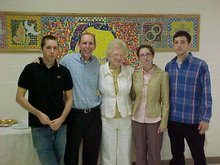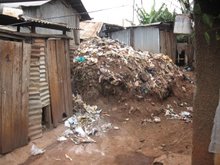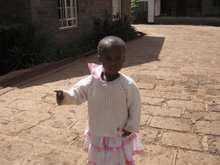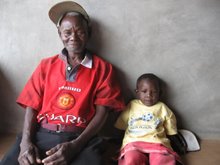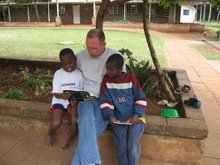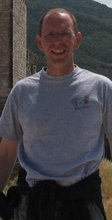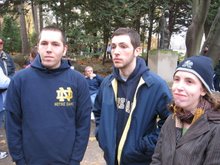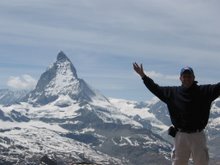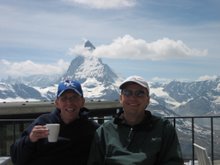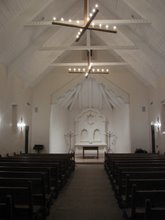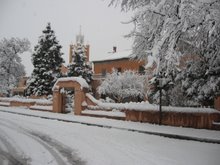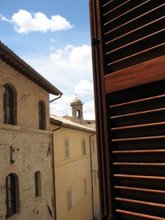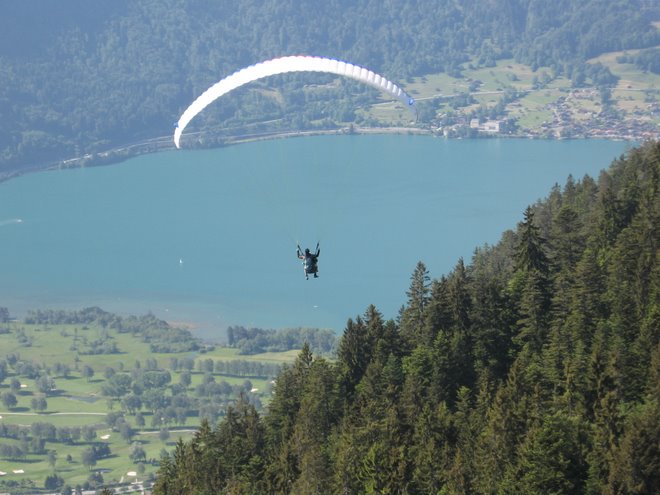The Mornings
I wake with the crowing of the roosters at about 5:30. My routine has been to stand at my little window that looks out on the rising sun and praying three prayers: The Daily Office from a book given to me by my Irish friend, a prayer to Divine Providence from the CDP sisters and finally a special prayer I wrote to unite me with my friends. When I rise, they are going to sleep. We pray the same daily/nightly prayer but on different continents.
I open the door to my little house and find Syokwaa starting the fire for the morning tea and breakfast. All the food is cooked on a fire started outside each day. Sometimes the open fire is built in the "kitchen" and so the house is always smoky. Every house has a little fire built outside and they glow each night. Beans and rice are always cooking somewhere.
 The day also begins with a walk to the water. There is a well dug and lines run to spickets throughout the village but often, more times than not, the generator for the pump is not working or turned off to conserve water in the arid land. I walk, like all the other villagers, to get water for washing or a morning "shower". My room has a little side room, or latrine with a hole in the concrete floor. Once you use the bathroom, you sprinkle a cup of ashes (from last nights fire) over it to keep down the smell and the insects. There is also a little space to shower – which is a bucket of water over your head – very cold in the morning, Sometimes I place a bucket of water in the hot sun and have a warmer shower after work. You get use to it all – the shower and the latrine and the bugs. Water is a major issue – finding it, carrying it, drinking it. I drink from big 10 liter bottles of clean water, purchased in Kitui (about and hour and a half away by truck) although I have been drinking some of the local water if it is boiled. It is heavy in saline and fluoride.
The day also begins with a walk to the water. There is a well dug and lines run to spickets throughout the village but often, more times than not, the generator for the pump is not working or turned off to conserve water in the arid land. I walk, like all the other villagers, to get water for washing or a morning "shower". My room has a little side room, or latrine with a hole in the concrete floor. Once you use the bathroom, you sprinkle a cup of ashes (from last nights fire) over it to keep down the smell and the insects. There is also a little space to shower – which is a bucket of water over your head – very cold in the morning, Sometimes I place a bucket of water in the hot sun and have a warmer shower after work. You get use to it all – the shower and the latrine and the bugs. Water is a major issue – finding it, carrying it, drinking it. I drink from big 10 liter bottles of clean water, purchased in Kitui (about and hour and a half away by truck) although I have been drinking some of the local water if it is boiled. It is heavy in saline and fluoride.Food
Food is a variation on a theme. Residents of the Village receive shipments of bags of rice, corn (Maize) and beans. Lunch and dinner are some combination of these. You've seen the big bags from the WFP – World Food Program. At times there is some meat. A cow broke it's leg last week and the village had some meat. It won't keep long – no refrigeration, Ugali is made from maize flour – stiffer than mashed potatoes and not as flavorful. Scuma is the local vegetable grown everywhere, It is not my favorite. Chapati is a flat bread fried in a hot skillet with a few of the meals. Drink is always water. Morning is either bread and butter, cold sweet potatoes but sometimes little cakes or mondazis.
My Work
I have been working at a library space shelving 32 cases of donated books from the U.S. I have divided into Preschool, Lower Primary, Upper Primary and Secondary. There can be no check out, maybe eventually, but the books would never return or return in poor shape. The library has a number of issues, the biggest being the dirt and dust that gets blown in every night. Everything gets a layer of dirt nightly. I purchased some heavy material from the town of Kitui, about an hour away. I sewed, with the help of Agnes, some panels that fit over each shelving unit. The sewing machine is one of about ten here, all pedal run. They make the students' school uniforms here – a smart mint green shirt and light green plaid shorts and jumpers. Eventually I learned the rhythm of the sewing machine pedals. Therr were also ten laptops which were donated and loaded with educational software. The computer issue is the lack of electricity. We are hoping to purchase solar panels – with the help of some donated funds! and therefor be able to light the room at night and power the laptops. The computers run Edubuntu – a software unfamiliar to me but is a version of Lynux as opposed to Windows. We will need to schedule classes for computer use and use of the library books. It is difficult because it "doesn't fit into the national curriculum.
Kamba
The language is a bit of a challenge. IO know just a bit of Swahili – as do some of the locals and many children, but the language spoken here is Kamba, the tribal language of this area and group. I am learning slowly with the help of the staff but especially from the children, They are eager to help me and laugh at my mistakes. Some greetings like "wamukaata", "waja" "uvawaku" are all greetings of a sort and used a lot. Others are much more difficult and the inflection changes everything. Mazungu is the word heard most often around me - "White Guy". I do stick out a little. There are only two of us anywhere near here. The kids stroke my hands because they are soft and pull the hairs on my arms and stroke my beard. All novelties.
Weather – Hot and no chance of rain tonight
The weather is hot and dry – similar to Vegas maybe in the days, quickly cool at night. By noon or 1:00 it is pretty intense. I have no clue how hot it is, no weather report or thermometer. There is almost always a breeze, stirring up the dirt! Most of the time the sky looks like the opening of a Simpson episode or a Windows Screen saver – bright blue with white fluffy clouds. Oh the nights! I have seen a huge full moon night but also the moonless nights where the stars take your breath away. You can see the Milky Way clearly. The only lights you can see are the flicker of fires built next to each of the 25 little houses for cooking. Currently there are about 185 children and 25 grandparents or caregivers. The oldest is 96. Everyone sings and dances – especially at church services and at school. The boys are always dancing and singing and hanging all over each other. Any friends walk hand in hand, arm and arm, no matter if they are boys or girls. It is interesting and catches you eye at first until you get used to the custom. There is never any feelings of being self conscious with physical affection.
Kitui
The trip to Kitui was long in coming. Kitui Town is about an hour (depending on the roads) form the village. It is the largest town anywhere close to the Village. It is only there where we can get supplies like bottled water, PB and J, etc, There are also two old computers in the town but I didn't have time to wait for one or wait for the power to come on. The manager of the village drove to Kitui to get an important email, only to find that the power had gone out. a wasted day's trip. When people hear there is a truck going to Kitui, everyone wants to get on board. we took a flatbed truck in order to pick up some raw wood etc. for a building project. The roads are crap – terrible and the drivers must maneuver like driving in a mine field. All the wood will need to be planed and cut, and dried before use. There is also an ATM, although my friend had his card taken by the machine. We wnt to lunch at a "nice" restaurant – beef chips and "fries" for four people cost about $8.00 US. Tasty after rice and beans and we had a Coke! There is a truck sent to pick us up along with the supplies. I ride in the back of the truck with about eight other locals. I get the points and stares – Mazungu. We stop at a service station and pick up more passengers. By this time I am crowded – sitting on a wooden bench, trying to keep my hat on and my back in alignment. Did I say the roads are crap? We ride for about an hour, headed home until we come to the junction in the road that we turn off for the 30 minute ride on dirt. We stop and squeeze six more people on the truck. A old woman, in her eighties cannot climb onto the truck. She hands me her live chicken, feet tied to hold for her. I can't refuse . Flapping wings and biting at me I hold the chicken she will no doubt kill for dinner tonight. It was quite a ride.


